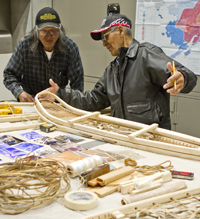Endangered Languages Conference Set for Smithsonian
Over half of the world’s languages are endangered. The Breath of Life Archival Institute for Indigenous Languages is working with Native Americans to revitalize their languages before they are gone forever. During a two-week program, participants will connect with libraries, archives and museums to support language learning and teaching. The Smithsonian’s National Museum of Natural History will host Breath of Life workshops June 9–21, enabling activists from North American indigenous endangered-language communities to partner with linguists to navigate archives, locate and acquire documents, interpret writing systems and transform archival materials into practical lessons for language learning.
“Washington is an ideal place for the Breath of Life because we have access to the collections of the Smithsonian and the Library of Congress,” said Ruth Rouvier, Recovering Voices program manager.
The Breath of Life Institute is based on the model developed for California languages in the early 1990s by the Advocates for Indigenous California Language Survival in partnership with the University of California, Berkeley. The 2013 Institute, like the one held in Washington, D.C., in 2011, will replicate the Berkeley model.
“Because the Breath of Life will be held by a public institution and because we want to foster future conversation, we hope to engage a wider audience through online media,” said Lisa Conathan, co-director of the 2013 Institute.
The conference will document much of the process and make it available through online channels. One of the main difficulties in language revitalization is building a community of speakers. By documenting the event, the Breath of Life organizers hope to create a resource for future generations interested in language revitalization.
The 2013 Breath of Life Institute is supported by the National Science Foundation through a grant to the Endangered Language Fund. Partners include the National Museum of Natural History, National Museum of the American Indian, the Library of Congress and Yale University. More information can be found at Endangered Language Fund.
Recovering Voices is an initiative led by the National Museum of Natural History in partnership with other Smithsonian units—the National Museum of the American Indian and the Smithsonian Center for Folklife and Cultural Heritage—that promotes the documentation and revitalization of the world’s endangered languages and knowledge. Drawing upon the Smithsonian’s scholarly expertise, comprehensive collections and public outreach capacity, Recovering Voices has worked since 2009 to develop strategies to conduct interdisciplinary and cross-cultural research to effectively collaborate with communities working to lessen language and knowledge loss. For more information about Recovering Voices, visit the website.
# # #
SI-200-2013
Ryan Lavery
202-633-0826

